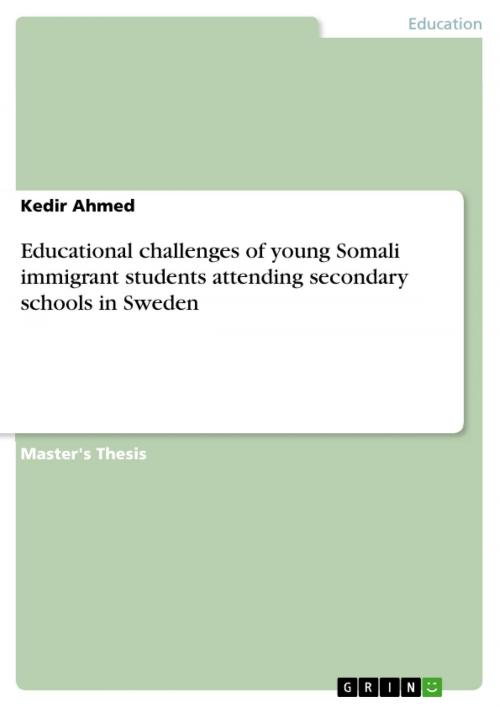Educational challenges of young Somali immigrant students attending secondary schools in Sweden
Nonfiction, Reference & Language, Education & Teaching, Educational Theory, Multicultural Education| Author: | Kedir Ahmed | ISBN: | 9783668050815 |
| Publisher: | GRIN Verlag | Publication: | September 21, 2015 |
| Imprint: | GRIN Verlag | Language: | English |
| Author: | Kedir Ahmed |
| ISBN: | 9783668050815 |
| Publisher: | GRIN Verlag |
| Publication: | September 21, 2015 |
| Imprint: | GRIN Verlag |
| Language: | English |
Master's Thesis from the year 2015 in the subject Pedagogy - Intercultural Pedagogy, Linköping University, language: English, abstract: Sweden has a long period of time been among the European countries that give asylum for many young immigrants from across the world. According to Swedish Statistics (2013), in 2012, 25% of the total numbers of immigrants to Sweden were children where 50% of the immigrants from Somalia and Afghanistan were minors and the total number of minor immigrants from Somalia increased with 70% in 2012. These young immigrants face different obstacles, including social problems and educational challenges after their arrival in Sweden. Studies show that young immigrant students in Sweden are having lower educational performance than their peer Swedish native speakers. This study identifies the challenges being faced by young Somali immigrants attending secondary schools in Sweden. The study focuses on children's' perspectives and examines their descriptions of their day to day life in school and the role of parents' involvement in the education of their children. The study utilizes qualitative research method, interviews with young Somali students and review of previous researches. The research found that language barriers, lack of educational background by the students, complicated Swedish school system and students' lack of integration are some of the major challenges faced by young Somali immigrants. Similarly, the study also revealed that lack of parental involvement due to lower educational background, unfavorable condition of home environment and lower economic status of their families are among the key factors that contribute on the lower educational performance of the students.
Master's Thesis from the year 2015 in the subject Pedagogy - Intercultural Pedagogy, Linköping University, language: English, abstract: Sweden has a long period of time been among the European countries that give asylum for many young immigrants from across the world. According to Swedish Statistics (2013), in 2012, 25% of the total numbers of immigrants to Sweden were children where 50% of the immigrants from Somalia and Afghanistan were minors and the total number of minor immigrants from Somalia increased with 70% in 2012. These young immigrants face different obstacles, including social problems and educational challenges after their arrival in Sweden. Studies show that young immigrant students in Sweden are having lower educational performance than their peer Swedish native speakers. This study identifies the challenges being faced by young Somali immigrants attending secondary schools in Sweden. The study focuses on children's' perspectives and examines their descriptions of their day to day life in school and the role of parents' involvement in the education of their children. The study utilizes qualitative research method, interviews with young Somali students and review of previous researches. The research found that language barriers, lack of educational background by the students, complicated Swedish school system and students' lack of integration are some of the major challenges faced by young Somali immigrants. Similarly, the study also revealed that lack of parental involvement due to lower educational background, unfavorable condition of home environment and lower economic status of their families are among the key factors that contribute on the lower educational performance of the students.















